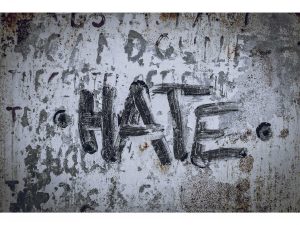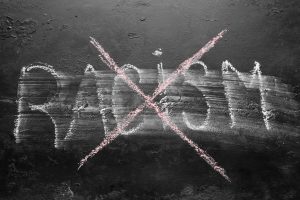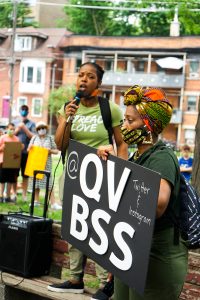Human rights at the TDSB: complex but- surely- possible
When a Minneapolis jury found Derek Chauvin guilty of 2nd degree murder, 3rd degree murder and manslaughter after a day’s deliberation last week there was relief that finally a police officer would be held to account after the thousands of deaths of Black people at the hands of police over the years. But from interviews just after the verdict was delivered, it was relief tempered by history and questions like: What about Daunte Wright, the young man in nearby Brooklyn Centre who was shot to death before Chauvin’s trial was even over? What about Breonna Taylor? What about Philando Castile? What about 12-year old Tamir Rice, shot because he was carrying a toy gun? What about the effects of systemic racism everywhere and the toxic sludge it leaves behind in public institutions like schools.
TDSB and human rights
The Toronto District School Board (TDSB) is at least trying to address the problem. If you like data, its Human Rights Annual Report 2018-2020, is just the thing. At 119 pages, it is chock full of information outlining incidents of anti-Black and anti-Indigenous racism, anti- Semitism, homophobia and similar problems that plague our communities and workplaces. It details responses to those incidents, rate of those responses, action taken to improve the rate of responses – it can take years to resolve a complaint. There’s an Action Plan for the overall problem of making sure that Human Rights are taken seriously at the TDSB. But despite all the activity described within, you can’t help but wonder where’s the beef or BeyondMeat or whatever suffices as a metaphor for something you can digest and use?
Rights Annual Report 2018-2020, is just the thing. At 119 pages, it is chock full of information outlining incidents of anti-Black and anti-Indigenous racism, anti- Semitism, homophobia and similar problems that plague our communities and workplaces. It details responses to those incidents, rate of those responses, action taken to improve the rate of responses – it can take years to resolve a complaint. There’s an Action Plan for the overall problem of making sure that Human Rights are taken seriously at the TDSB. But despite all the activity described within, you can’t help but wonder where’s the beef or BeyondMeat or whatever suffices as a metaphor for something you can digest and use?
With more than 245 000 students and 40 000 staff, the TDSB recognizes that one thing for certain: “The data clearly indicates that the Board continues to have a serious racism problem. Race or race related grounds is the most frequent source of complaint received by the Human Rights Office making up 54% of all complaints alleging a human rights violation.” Reports of homophobia are up at an “alarming rate.” A recent census of students from grades 7-12 indicated that Black, Indigenous, Indigenous spirituality-practicing as well as gender non-conforming students don’t believe that school rules are applied fairly to them. These kids along with other Latin-American and LGBTQ2S students have less sense of belonging in their schools.
Managers across the board, must report any incidents of hate, bias or racism. Principals and Vice-Principals, according to TDSB media relations officer Shari Schwartz-Maltz, must report such incidents on a new Racism, Bias and Hate Reporting Portal available to them, something she thinks makes it much easier for information to be collected and action taken. The question remains how students and parents can safely and confidentially report incidents in a way that won’t invite retribution from peers or staff.
| SCHOOL YEAR | NUMBER OF ACTIVE COMPLAINTS AT THE START OF THE SCHOOL YEAR (September 1) | NUMBER OF COMPLAINTS RECEIVED | NUMBER OF COMPLAINTS RESOLVED | NUMBER OF ACTIVE COMPLAINTS AT THE END OF THE SCHOOL YEAR (August 31) |
| September 1, 2018 to August 31, 2019 | 287 | 209 | 216 | 282 |
| September 1, 2019 to August 31, 2020 | 282 | 202 | 139 | 343 |
The report writers go to considerable pains to detail the complaints made to the Human Rights Office (HRO) between September 1, 2018 and August 31, 2020. The HRO began the 2018 school year with 287 unresolved complaints based on race, disability, age, creed, sexual orientation and gender identity in roughly that order of magnitude. It somehow resolved 355 of them along with other complaints reported in the meantime. By August of 2020, there were 343 complaints for the Office to resolve. The vast majority of the complaints (94-97%) were workplace related with a much smaller proportion – 18 incidents over the two years- reported as coming from schools in the course of their work with kids and communities.
Information is broken down by school year and month, by cases remaining open vs. cases closed and the time it took to close them, by whether or not they were simply workplace harassment or human rights based – or both. Data is sliced according to complainants’ work affiliation: management, teachers, parents, student secondary or elementary, CUPE workers and so on. It details consultation by the HRO over human rights, listing them by month.
Incidents of hate
Hate is a big factor considered in the HRO report. TDSB employees must report “any hate-motivated violence or incitement to hate- motivated violence” they have witnessed and this includes “any symbols or other  representations clearly identified with groups which promote hate and violence.” There were 64 Hate Activity Reports sent to the TDSB Human Rights Office by the end of 2018-19 and another 291 submitted during 2019-20. By far and away, most hate incidents had to do with race: 201 of the 291 incidents reported in 2019-20 and most of those involved anti-Black racism, at 119 cases. The report also notes a major increase in anti-Asian hate – moving from 0 incidents in 2018-19 to 19 cases in 2019-20. That year, there were 48 hate incidents of homophobia and 31 cases of Anti-Semitism. This is a truly alarming picture.
representations clearly identified with groups which promote hate and violence.” There were 64 Hate Activity Reports sent to the TDSB Human Rights Office by the end of 2018-19 and another 291 submitted during 2019-20. By far and away, most hate incidents had to do with race: 201 of the 291 incidents reported in 2019-20 and most of those involved anti-Black racism, at 119 cases. The report also notes a major increase in anti-Asian hate – moving from 0 incidents in 2018-19 to 19 cases in 2019-20. That year, there were 48 hate incidents of homophobia and 31 cases of Anti-Semitism. This is a truly alarming picture.
There is another problem: racism faced by Black leaders within the TDSB. All of this data revealed “…a disproportionate number of complaints from Black administrators involving allegations of anti-Black racism, that is suggestive of a potential systemic problem…Staff census data also reveals that racialized employees are less likely to view the TDSB as a fair and non-discriminatory workplace.” Racialized people working for the board are experiencing racism – the report doesn’t say anything about the incidents themselves – but the problem is clear.
Responding to problems
Where does the TDSB stand in its response to these issues? The HRO offers a continuum of Human Rights Organizational Change outlining the stages in its progress:
-
-
- Erasure, suppression and minimization of human rights issues
- Identification of human rights issues and crisis/conflict management
- Early detection and resolution of human rights issues
- Proactive systemic prevention and inclusive systems design
-
The report is pretty frank: “ the data in this Report suggests that the TDSB is predominantly at Stage 2 of this continuum …” But lack of a way for students and parents to report human rights violations and the huge backlog of cases, puts the Board right at the beginning of the process. On the other hand, the report claims the TDSB is more proactive in the way that schools are reporting and monitoring racism and hate activity.
In a nutshell, progress is varied. But the TDSB, around since 1998, has acknowledged the problem by restructuring its Human Rights office, hiring 10 new staff members overseen by Executive Superintendent Jim Spyropoulos. The HRO report says the board has improved its oversight through “very intentional focusing of efforts on expanding our monitoring tools functions and mandate…” It says it has increased accountability for human rights along with staff learning more about human rights as they “… have shared ‘eureka’ moments, occasioned or inspired by HRO staff members…” It calls for additional training for TDSB supervisors, in particular, Principals and Vice-Principals. Yet, it needs to go further and make sure that all staff get thorough training about the nature and consequences of hate, targeting groups of people and racism.
Day to day reality
What this means in the practical day-to-day life of people working for the TDSB is that there are many staff members waiting at home for incidents to be resolved, while the TDSB and Toronto Police Service try to create a safe way for them to return to work. Gary Pieters of the Urban Alliance on Race Relations told the Toronto Star in February, that staff wait at home for years as an investigation unfolds and adding that points to the dysfunction of the HRO. The average time it takes to close a case was 539 days in 2019-20. One administrator has been away from school for 4 years.
members waiting at home for incidents to be resolved, while the TDSB and Toronto Police Service try to create a safe way for them to return to work. Gary Pieters of the Urban Alliance on Race Relations told the Toronto Star in February, that staff wait at home for years as an investigation unfolds and adding that points to the dysfunction of the HRO. The average time it takes to close a case was 539 days in 2019-20. One administrator has been away from school for 4 years.
Some staff even had to turn to Workplace Safety Insurance Board (WSIB) for help to deal with the trauma of hate incidents. In one case, a TDSB administrator was physically attacked, sustained injuries and is still at home on medical leave. In the case of teaching staff, people involved in a human rights issue are sent home and told not to speak to anyone for fear of confounding the investigation. They can’t talk to their colleagues or even, sometimes, friends and family about something that has been traumatizing.
These issues continue. The Toronto Police Service needs to investigate them but, from experience, appears to be reluctant to do this. While the Human Rights Office has hired new staff, it remains to be seen if this will enable it to deal appropriately with the backlog of old cases. So far that hasn’t happened.
The TDSB deserves credit for putting out this report; it is not a good-news item. As Ontario education Assistant Deputy Minister, Pat Case wrote in response to our questions, “TDSB was incredibly courageous to put out that report. It’s the first time that I’ve seen any organization marshal all of its available data and resources to speak the truth about how amazingly difficult it is to encourage open access to an office and to satisfy the need for resolution.” He adds that it is also “unbelievably complex.”
Action…
Nonetheless, what does the TDSB plan to do beyond what we’ve already outlined to address the increasing problems of hate, racism, homophobia, discrimination according to ability and creed? It is taking a largely systemic approach, putting systems and committees in place to develop different plans. Shari Schwartz -Maltz described the Organization Response Team of representatives from Social Work, Safe Schools, Equity and other departments who can respond to an incident and help students and staff involved learn from it.
 The report speaks of “capacity building”- otherwise known as learning – and developing “tools and resources.” It addresses “Outreach and Engagement” through a “student/Parent Outreach and Engagement Plan to inform HRO efforts. There’s more about “Systemic Accountability” and the board’s commitment to “…develop and implement a human rights accountability framework…” But here’s the problem: the TDSB doesn’t seem to be able to go beyond that systemic view of broad statements, committees and action plans. The report doesn’t describe specific incidents, something that might give readers a feel for the degree of hate, racism, homophobia, anti-Semitism and the rest. It doesn’t tell us about the nature of the incidents – are they threats, remarks, physical acts – what? What does it suggest the Board do for schools and workplaces that have become toxic because of the number of reports of completely unacceptable behaviour?
The report speaks of “capacity building”- otherwise known as learning – and developing “tools and resources.” It addresses “Outreach and Engagement” through a “student/Parent Outreach and Engagement Plan to inform HRO efforts. There’s more about “Systemic Accountability” and the board’s commitment to “…develop and implement a human rights accountability framework…” But here’s the problem: the TDSB doesn’t seem to be able to go beyond that systemic view of broad statements, committees and action plans. The report doesn’t describe specific incidents, something that might give readers a feel for the degree of hate, racism, homophobia, anti-Semitism and the rest. It doesn’t tell us about the nature of the incidents – are they threats, remarks, physical acts – what? What does it suggest the Board do for schools and workplaces that have become toxic because of the number of reports of completely unacceptable behaviour?
That might induce some pointed questions about what actually happens when someone acts badly. For instance, what happens to staff members who act in a hateful, racist manner? There is nothing in the report about disciplinary measures – not a single table. We put the question of discipline to Jim Spyropoulos, in charge of the HRO at the beginning of April, but haven’t yet received a reply.
Case in point: Queen Victoria PS
It’s been well over a year since Queen Victoria Public School’s former Vice-Principal Jamea Zuberi opened up her email to find a disgusting, racist hate letter waiting for her. She was popular with the school community and worked hard to help Queen Victoria Black Students Success Committee (QVBSSC) organize to support Black students at the school. When she transferred to another school at the end of Fall term in 2019, parents organized Queen Victoria’s first Kwanzaa evening to wish her well. Someone didn’t like that and wrote:
“I’m glad you bought my “sorrowful” goodbye to you in December. Really, I was thinking ding-dong, the witch is gone! I’m so happy to see you leave. You and your little crew that made everything about black this and that. So what, white people don’t count? The pushing your way through classrooms the way you did in November… I mean I never even got a thank you when I bought lunch for ALL of you. Ungrateful!…Well, got rid of (redacted). Now I got rid of you just have a few more on the list to go.”
To make a long story short, the TDSB did not handle this incident well. Though senior staff knew about the letter, parents of the school didn’t find out about it until it was leaked to them in April. The board apologized for the way it mishandled the situation, brought in different superintendents and hired a lawyer to investigate the matter of the hate mail.
letter, parents of the school didn’t find out about it until it was leaked to them in April. The board apologized for the way it mishandled the situation, brought in different superintendents and hired a lawyer to investigate the matter of the hate mail.
The investigation’s report wasn’t made public. Parents never did find out who sent the letter, though it’s clearly someone who knew the people involved. There’s no discipline or consequence reported. There are no details from TDSB staff acknowledging the mistakes they made. Instead, senior staff laid on, no doubt useful, but uncalled for, anti-racism workshops for teachers and parents. They also put in place a “process that will assist staff to address and respond to acts of racism.”
Asked about this mess, Shari Schwartz-Maltz said the situation at the school was very complicated. That’s true, but it’s also the nature of human relations within any school, let alone a huge school board. Set aside the data, the hopes for the future, the learning plans, the question remains: what will TDSB do, in a demonstrable way, to cut through that complexity and address hate and human rights?
Nigel Barriffe is a leader in the local teachers’ federation Elementary Teachers of Toronto and chair of the Urban Alliance on Race Relations.
David DePoe is a retired teacher and long-time activist within Toronto school boards including the TDSB.
William Paul is a retired TDSB principal and the editor of School Magazine.

